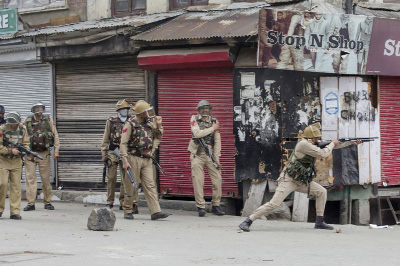
Separatist leaders called for a shutdown in Indian-controlled Kashmir on Saturday as the Indian prime minister began his daylong visit to review development work and inaugurate road projects, officials said.
Shops, businesses and schools were shut while thousands of paramilitary troops and police in flak jackets spread out across Kashmir and closed off roads with razor wire and iron barricades in anticipation of anti-India protests and clashes.Separatists groups that challenge India’s sovereignty over Kashmir called for the strike and a march to the commercial hub in the main city of Srinagar to protest Prime Minister Narendra Modi’s visit. Government forces enforced a security lockdown in downtown Srinagar, the urban heart of anti-India protests, as they warned residents to stay home to foil protests.
Road traffic was sparse with buses staying off the roads and few private cars venturing out. Modi arrived in the remote mountainous Ladakh region bordering China, where he inaugurated work on a strategic 14-kilometer (9-mile) -long tunnel connecting the cold desert region with the Kashmir Valley.
Modi was later scheduled to inaugurate a controversial hydroelectric power project in the Gurez Valley along the highly militarized Line of Control that divides Kashmir between nuclear-armed rivals India and Pakistan.
Pakistan has objected to the design of the project, invoking the Indus Water Treaty. The two neighboring countries signed the treaty in 1960, brokered by the World Bank, to share the vast water resources from the Indus River system, which supplies water to both.
India and Pakistan each administer part of Kashmir, but both claim it in its entirety. Rebels have been fighting Indian rule since 1989, demanding Indian-controlled Kashmir be united either under Pakistani rule or as an independent country. Most Kashmiris support the rebel cause while also participating in civilian street protests against Indian control. India accuses Pakistan of arming and training the rebels, a charge Pakistan denies. Nearly 70,000 people have been killed in the uprising and the ensuing Indian military crackdown.
India’s Modi to inaugurate hydro project in Kashmir, Pakistan protests SRINAGAR, India (Reuters) – Indian Prime Minister Narendra Modi will inaugurate on Saturday a hydroelectric power plant in the state of Jammu and Kashmir, prompting protest from neighbor Pakistan that says the project on a river flowing into Pakistan will disrupt water supplies.
The 330 megawatt Kishanganga hydropower station, work on which started in 2009, is one of the projects that India has fast-tracked in the volatile state under Modi amid frosty ties between the nuclear-armed countries.Pakistan has opposed some of these projects, saying they violate a World Bank-mediated treaty on the sharing of the Indus river and its tributaries upon which 80 percent of its irrigated agriculture depends.
“Pakistan is seriously concerned about the inauguration (of the Kishanganga plant),” its foreign ministry said in a statement on Friday. “Pakistan believes that the inauguration of the project without the resolution of the dispute is tantamount to violation of the Indus Waters Treaty (IWT).”
The Kishanganga project was delayed for several years as Pakistan dragged India to the International Court of Arbitration, which ruled in India’s favor in 2013.
India has said the hydropower projects underway in Jammu and Kashmir are “run-of-the-river” schemes that use the river’s flow and elevation to generate electricity rather than large reservoirs, and do not contravene the treaty.

